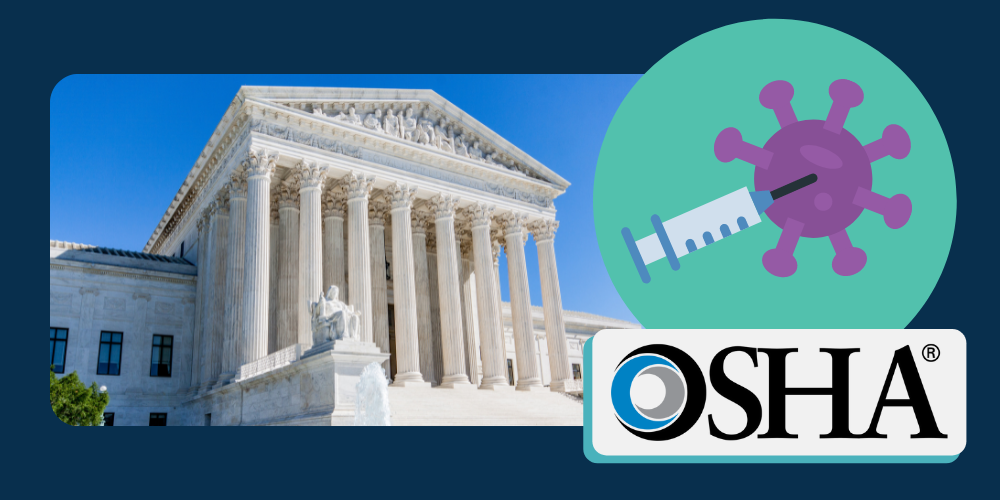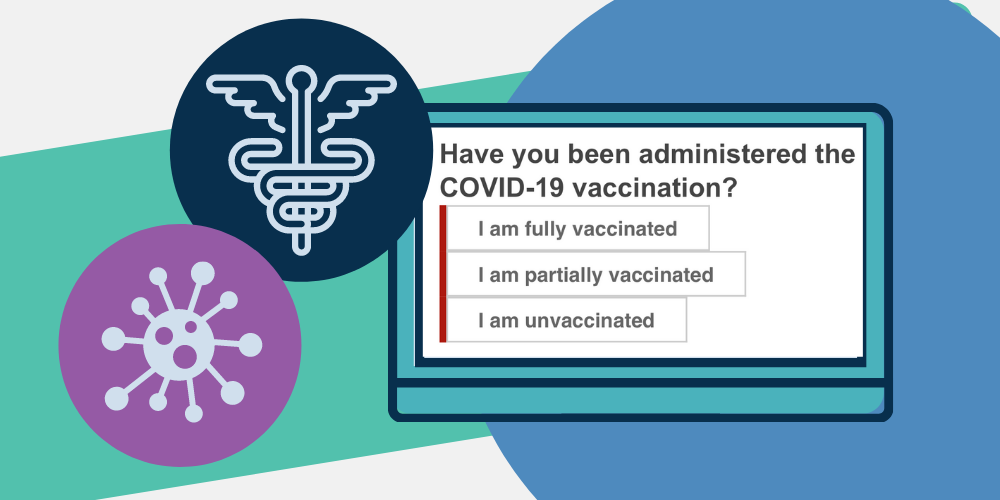
After spending the better part of two months winding its way through the courts, OSHA’s Emergency Temporary Standard (ETS) on Vaccination and Testing has finally reached the Supreme Court.
Based on how the arguments played out last week, many legal experts predict the ETS is likely to be struck down, which begs the question:
If the Supreme Court blocks the ETS from moving forward, are employers off the hook for adopting a workplace policy requiring employees to be fully vaccinated or undergo weekly COVID-19 testing?
Not necessarily.
Regardless of the fate of the OSHA ETS, employment law experts agree that doing nothing is not an option. Let's walk through the four main reasons why employers should start tracking employee vaccinations and testing sooner rather than later.
1. Employers must still contend with state and local requirements
Even without federal-level guidelines requiring employers to implement vaccination policies, there are still state and local governments that have rolled out their own laws and mandates.
California, New York, and Illinois enacted vaccine mandates months ago, and some states, like Minnesota, have adopted the ETS as part of their OSHA state plan.
At a local level, cities like Boston, New York City, and Philadelphia have also announced vaccine requirements for many businesses operating indoors.
Multi-state employers have even greater challenges
Employers will obviously need to be prepared to comply with their specific jurisdiction’s laws, but the situation is even more complicated for employers that operate in multiple states. Multi-state employers must contend with workplace vaccination requirements that vary widely across multiple jurisdictions.
For example, an employer may have to simultaneously accommodate requirements from states that have instituted strict employee vaccination mandates, while also taking care not to overstep in states that have instituted bans on requiring employee vaccination.
Complying with the requirements of multiple jurisdictions results in a significant administrative burden for HR teams, which is why technology needs to play a key role in managing such complexity. That’s why we equipped our Vaccine Tracker app with functionality that allows employers to create multiple policies under which employees can be classified.
2. Vaccination and testing policies can help employers avoid lawsuits by reducing their liability
Another huge reason employers need to get serious about rolling out an employee vaccination policy? Avoiding lawsuits from employees.
The OSH Act’s “General Duty” clause says employers have a “general duty” to ensure a safe workplace for employees. This clause is not dependent on the passing of the OSHA ETS, which means that the potentially fatal consequences of doing nothing to mitigate the spread of the virus within a workplace can result in costly litigation, OSHA penalties, and considerable hits to a brand’s reputation.
It's no surprise to see the uptick in employment and labor lawsuits related to COVID-19. According to the Jackson Lewis COVID-19 Employment LitWatch, there have been 287 cases citing workplace safety since March 2020.
See’s Candies hit with COVID-19 wrongful death suit
One of the most notable cases is a wrongful death suit filed in California against See’s Candies. An employee of the company claimed general negligence and premises liability after she contracted COVID-19 at her workplace and passed it on to her husband, resulting in his death.
What’s interesting about this case is the court’s decision that the employee’s COVID-19 negligence claims are not subject to exclusive remedy provisions in the state’s workers compensation law. Sometimes referred to as “the great bargain,” exclusivity provisions are designed to shield employers from civil litigation involving liability and negligence in exchange for providing injured workers with compensation for workplace injuries.
When See’s Candies cited exclusive remedy provisions as a reason to dismiss the lawsuit, the courts refused. Their reasoning was that the “grand bargain” does not extend to injuries and deaths of non-employees because exclusivity provisions are an arrangement between employer and employee.
So, how do employers avoid lawsuits like this?
While employers in states with stricter requirements around employee vaccination and testing may already be legally compelled to cultivate a safe workplace, employers in jurisdictions with more lax requirements should explore rolling out a policy that can insulate the company from future litigation.
“Employers should continue to monitor guidance from the CDC, local health departments, state requirements, and of course, OSHA, for implementing best practices in the workplace,” explains Melanie L. Paul, a Principal at Jackson Lewis, P.C. “Reliance on such guidance could be an employer’s best defense to COVID-19 lawsuits. And, even without the ETS, OSHA will continue vigorous enforcement. Temporary staffing agencies as well as other higher-risk industries are especially vulnerable to being targeted by OSHA for COVID-19 related inspections under OSHA’s Revised National Emphasis Program for COVID-19."
One idea for reducing liability is to implement a policy that aligns or draws from the OSHA ETS guidelines. Aligning your workplace policy with the OSHA ETS can reduce employer liability by serving as an affirmative defense in the event of litigation involving injuries stemming from an employee’s exposure to COVID-19.
"Federal OSHA sets a floor, not a ceiling,” Paul says. “OSHA state plans, or any private employer, for that matter, can adopt the ETS or require even more to combat COVID-19.”
We’re already seeing this move from some private employers, as well as states like Minnesota, which have adopted the ETS as part of their OSHA state plan.
3. Tracking vaccinations and testing helps you manage incidents quickly and avoid short staffing or revenue loss
Keeping track of employee vaccinations and COVID test results can help employers ensure compliance and reduce legal liability, but there’s one other major business benefit to consider. Requiring vaccinations or testing in the workplace allows you to make smarter, more informed decisions about your business operations.
The need for these insights couldn't be more evident in the wake of the recent Omicron surge that left many workplaces reeling. As the highly contagious variant swept the nation, businesses were forced to run with skeleton crews or shut down completely for a few days because so many workers contracted the virus seemingly all at once.
Without knowing the vaccination or testing status of employees, you can’t accurately assess the risks in your workplace, nor will you be able to respond quickly enough to manage incidents and mitigate potential impacts to revenue.
For example, if you require employees to take a COVID test every week and disclose their test results, it’s much easier to spot and isolate potential outbreaks in the workplace before the virus spreads to more of your staff.
You can easily automate processes like this with vaccine tracking applications like the BP Logix Vaccine Tracker. This application can not only help employers track employee vaccination data and test result data, but it also offers incident management features. If an employee tests positive, the system can trigger workflows for mitigating spread to other employees and facilitating the employee’s safe return to the workplace once they have recovered and are fit for duty again.4. Clients of staffing firms and other vendors may require vaccination/testing proof for any worker placements
Rolling out an employee vaccination and testing policy is especially critical for businesses that place employees at client worksites. For example, staffing agencies that work with numerous clients must be able to accommodate the workplace policies of all of their clients. If they can’t, the staffing firm could risk losing business.
Making sure a staffing firm’s workforce can comply with policies across multiple client placements undoubtedly creates a lot of administrative burden, but technology can reduce that burden. In the case of staffing agencies, the BP Logix Vaccine Tracker allows administrators to create unique policies based on the requirements of each client worksite, which can then be applied the workers based on their placements.
Start tracking employee vaccinations and COVID testing in mere weeks
![]() Whether or not the OSHA ETS is reinstated, employers should still prepare to track employee vaccination status if they want to truly reduce their risks in a global pandemic.
Whether or not the OSHA ETS is reinstated, employers should still prepare to track employee vaccination status if they want to truly reduce their risks in a global pandemic.
The BP Logix Vaccine Tracker application can help. This app makes it easy for large employers, staffing firms, and PEOs to:
- Track employee vaccination status, test results, and symptoms
- Comply with vaccination requirements across multiple jurisdictions
- Avoid COVID-related workplace liability lawsuits
Book a free demo today to get started:



